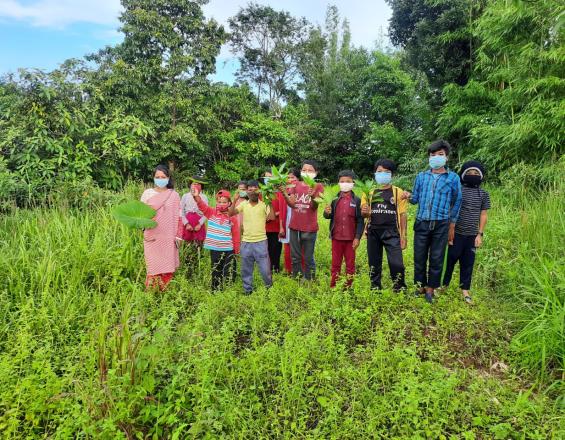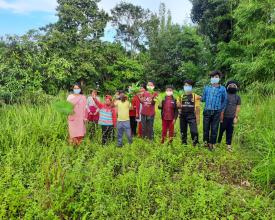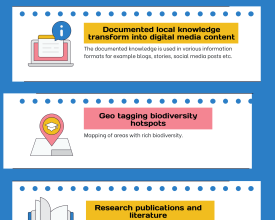
Agrobiodiversity (ABD) Walks with the youths

Agrobiodiversity (ABD) Walks are one of the fundamental tools implemented in our organization. They help in intergenerational knowledge exchange and, at the same time, raise awareness about the diversity of local food plants and the richness of Mother Earth. ABD Walks are targeted particularly at young age groups and take place in the different local food production systems. In these walks, youths are guided by knowledge holders and are introduced to various food plants, wild edibles and medicinal plants. This knowledge is passed down from generation to generation.
During this activity, local food plants are documented among youths, which leads to increased appreciation of the rich local biodiversity. Apart from getting involved in school activities and getting detached from nature, youths have become more confident in their knowledge of their local landscape and agrobiodiversity.
Context
Challenges addressed
- One major challenge that the solution addresses is to revive and preserve the food plants on the verge of extinction.
- Decreased knowledge of local agrobiodiversity, decreased transmission of local knowledge.
- Decreased consumption of wild food plants and local crop varieties among community members, children, youth and even urban population.
Location
Process
Summary of the process
- Local knowledge on foods documented.
- Local knowledge transform into digital media.
- Mapping of areas with rich biodiversity.
- Collecting and compiling of data regarding information on local biodiversity.
Building Blocks
Visit to different Food Production Systems
During the Agrobiodiversity (ABD) Walks, youths are taken to nearby biodiversity hotspots within the community. During the ABD walks, the youths and local knowledge holders collect and identify a number of species and wild food plants that make their local food production system.
Enabling factors
- One local knowledge holder from the community is involved in facilitating these visits in the food production system.
- The knowledge holder identifies particular species found in the food production system.
- The process is being recorded and stored in archives for future references among the youths in the community.
Lesson learned
- The youths are required to imbibe this knowledge to understand on how to further enhance our local food production systems.
- There is a need to expand local youth networks to strengthen such activities.
- Within the youth network there should be capacity building within the framework of such field visits for media documentation.
- Information, Education and Communication (IEC) materials can also be one of the major contributions towards growth and development of interest within the urban youths that can be propagated via different social media channels and field visits.
Knowledge exchange, documentation and catalogue
- Transmission of knowledge from elders to youths.
- Local food plants are documented among youths to increase awareness about the rich biodiversity.
- Through documentation, catalogues can be developed in the form of ABD books and recipe books.
Enabling factors
- Access to technology for documentation.
- Strong social media presence for dissemination of information for such activities.
- Interactive stories.
- Podcast.
- Youth seminars and workshops.
Lesson learned
- Capacity development
- Knowledge for investment
- Policy support
Impacts
-
ABD Walks have helped youths of the community to learn and appreciate the rich biodiversity and the importance of protecting Mother Nature and its richness.
-
There has been an increased consumption of wild edibles among youths.
-
Domestication of underutilized wild food plants helped prevent them from becoming extinct.
-
There is a learning and sharing of traditional knowledge amongst elders and youths.
Beneficiaries
-
Young children
-
Local knowledge holders
-
Community members

